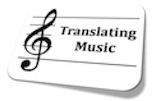25 October 2013: 10 - 5pm Europe House, 32 Smith Square, London SW1
Symposium: Opera, Multilingualism and Translation
Opera does not have the best of reputations when it comes to popularity and accessibility. Its exclusive image persists. Yet, a dying genre in the 1970s, it is now more popular than any other classical genre, particularly in the United States and China, the two leading economic nations of the world. In many respects, and in spite of its elitist connotations, opera is the perfect social art form of the 21st century: a hybrid form that emerges out of visual, theatrical, linguistic and musical elements, and that promotes accessibility.
Opera in the 21st century is not only performed in grand theatres, it has taken to the streets, to pubs and to cinemas. It exists transnationally, transculturally and translinguistically. For Juliana Gondek, Professor of Voice at UCLA, since we live in primarily visual cultures, the association of music and visual elements of production, plays a large role in popularising operas and musicals across social boundaries and generations.
The theme of this symposium, ‘opera, multilingualism and translation’, explores how the genre contributes to promote multilingualism in the widest possible sense of this notion: subtitling opera for DVDs, surtitling for small festivals and for large national opera house, exploring the challenges of singing in translation, exposing the importance of making opera performances available to a wide range of audiences, be they part of the general public or people with special needs, are the key themes explored by the professionals of music in translation below: Lucile Desblache (University of Roehampton); Adriana Tortoriello (University College London and freelance translator); Helen Julia Minors (Kingston University); Jane Manning (International Singer); Sarah Hoford (Azuriales Opera) and Damien Kennedy (English National Opera). The discussion ends with a round table, with the addition of Judi Palmer (Royal Opera House) and David Harsent (Professor of English and librettist of Gawain, by Harrison Birtwistle).
The symposium involved both academics researching this area and professionals working in the field. Participants included:
Lucile Desblache (Roehampton University)
David Harsent (Roehampton University)
Sarah Holford (Les Azuriales Opera)
Damien Kennedy (English National Opera)
Jane Manning (linguist and international singer)
Helen Julia Minors (Kingston University)
Judy Palmer (Royal Opera House)
Adriana Tortoriello (University College, London and freelance translator)
Scroll down for presentations
Tea/coffee on arrival from 10 am
10.30-11
Lucile Desblache: Opera’s languages
11-11.30
Adriana Tortoriello: Subtitling Opera for DVD
Adriana Tortoriello discusses the specificities of DVD opera subtitling and the challenges of conveying the humour of Gilbert and Sullivan's patter songs to an Italian 21st century audience.
11.30-12
Helen Julia Minors: Fusing words and music: charting the new production of “Midsummer Night's Dreams”
Using her recent experience of the 2013 Macerata Opera Festival, Helen Julia Minors, of Kingston University outlines the stimulating intersemiotic transfers taking place in a production of Midsummer Night's Dream, which blend Mendelssohn's work with Britten's 'translation' of Shakespeare.
12-12.30: questions
12.30-1.30 Lunch
1.30-2 Jane Manning: The Vocal Instrument in Song and Speech
Drawing on her experience as an international singer, particularly acclaimed for her interpretations of in contemporary music, Jane Manning (OBE) discusses the challenges and the joys of singing Schoenberg's Pierrot Lunaire in different languages.
2-2.30: Sarah Holford: Surtitling Opera for a small company
Sarah Holford retraces how she and her husband built a small opera company in the south of France, Les Azuriales, stressing the various technical and linguistic issues that producing opera on a small scale brought to the fore.
2.30-3: Damien Kennedy: Surtitling for the English National Opera
Damien Kennedy, Musical Library Surtitles manager at the English National Opera gives a history of accessibility in this institution and discusses why and how the decision was made to provide interlingual surtitles in spite of the fact that all productions are sung in English.
3.15 – 4: Round table
Questions
4: Drinks and snacks.
-----------------------------------------------------------------------------------


